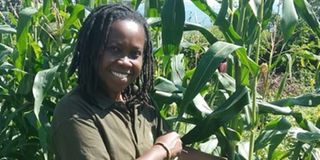Why I switched to organic farming

What you need to know:
- Like many farmers, she used pesticides and fertilisers which were chemical-based and readily available in the market.
- Four years into the venture, she had read so much on the negative effects of the use of chemical-based farming inputs that she wanted to get a solution for it.
Sylvia Miloyo started faming as soon as she completed her undergraduate studies in community development.
This is because farming was her first love. But there was a problem.
Like many farmers, she used pesticides and fertilisers which were chemical-based and readily available in the market.
Four years into the venture, she had read so much about the negative effects of the use of chemical-based farming inputs that she vowed to get a solution for it.
This prompted her into becoming an organic farmer.
She transformed her farm into an organic farming set-up using her savings.
"As of acquiring skills, I just practiced, did a lot of reading and attended short trainings at Real IPM in Thika," said Sylvia who also holds a Diploma in Business Management.
In this type o farming, she had to include a variety of crops, mainly vegetables.
“In organic farming, you never really mono crop. I have never practiced mono cropping but prefer to grow at least 15 to 20 types of vegetables at every one point," she said.
According to Ms Miloyo, organic food is healthy for humans and animals . She practices farming in her two farms in Limuru (five acres) and Mai Mahiu (10 acres).
Since adopting organic farming, she says she has attracted clients who she says “are about what they eat and want to only consume safe products.”
According to the White Paper Report on Pesticide use in Kenya, Pesticides are widely distributed in the environment (like air, soil, water and plants) and as a result, water and soil quality are decreasing and there is an increase in chronic health effects that are suggested to be related to pesticide exposure.
"Many pesticides are either acutely toxic, have long-term toxic effects, are endocrine disrupters (acting on the hormone system), are toxic to different wildlife species or are known to cause a high incidence of severe or irreversible adverse effects," reads part of the survey.
Ms Miloyo sells her produce mainly through home delivery based on requests.
“Many of our clients are middle class working people and our pricing is very similar with conventional farming, so we basically sell to everyone.”
She noted that takes at least three to years to convert from conventional farming to organic farming.
This also comes with the challenge of battling with pests and diseases in the beginning before you create a micro climate and have a natural balance, where you no longer have too many pests to deal with.
“Market can be an issue for organic suppliers because the populace are not well educated on the benefits of organic farming.”
In order to meet the demands of all her clients, she has an outlet in Nairobi, from where she sells her produce.
She has established dams to collect rain water as well as a borehole for irrigation.





